April 12, 2023
![]() 9 mins Read
9 mins Read
From state education to high-end accommodation, Sydney’s century-old Department of Education building has recently opened as Capella Sydney, after almost a decade of painstaking restoration and renovation. Part of the new ‘Sandstone Precinct’ just steps from Circular Quay and the Sydney Opera House, Capella Sydney places a strong focus on sharing untold stories of Sydney’s bygone era, captivating us from the moment we arrive.
If George McRae were alive today, he would be well-placed swilling whisky in the glamorous Victorian-style bolthole that bears his name at Capella Sydney. During the Scotsman’s tenure as the New South Wales government architect in the early 1900s, he would leave the Edwardian Baroque-style Department of Education building, among other notable landmarks such as Sydney Town Hall and the Queen Victoria Building, as his legacy.
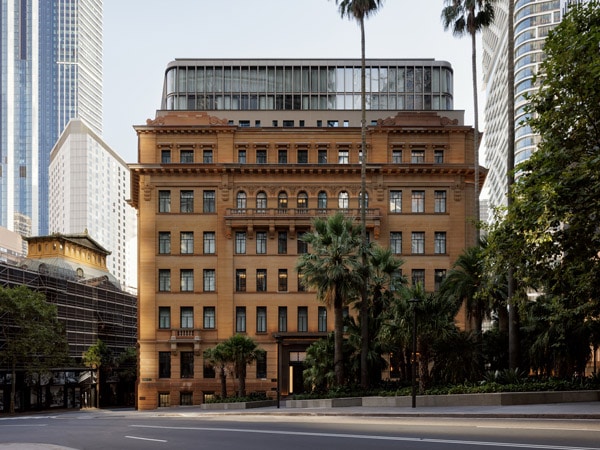
The century-old State Heritage-listed building has been meticulously restored. (Image: Timothy Kaye)
Used as bureaucratic offices until 2015, by the Department of Education and, earlier, also the Department of Agriculture, the century-old State Heritage-listed building in Circular Quay was leased to Pontiac Land who began a meticulous seven-year restoration, reimagining the property as luxury hotel Capella Sydney. This is the first foray into Australia for the Singapore-based company which owns Capella Hotels and Resorts.
The newly opened hotel forms part of the ‘Sandstone Precinct’, which includes the adjacent 19th century Department of Lands building, currently under restoration and renovation as the second stage of Capella Sydney. Due for completion in 2026, this building will house an event space, premium retailers and dining.

The Sandstone Precinct is within walking distance of the city’s iconic attractions. (Image: Destination NSW)
New neighbourhood Quay Quarter across the street is a hidden pocket of laneways heaving with on-trend eateries and boutique stores, including an artisan bakery, a gelateria, small bars and coffee shops. Down the street, other sandstone beauties stand the test of time, such as the 1851 Treasury Building (now InterContinental Sydney) and the 1860s Chief Secretary’s Building.
The restoration of Capella’s Florentine Palazzo-style façade was done so sensitively, there’s little indication of the luxury that lies within. Passers-by might be unaware if it weren’t for the impeccably dressed bellperson manning the Loftus Street entrance. Waiting at the marble-clad vestibule adorned with a carved English Royal Coat of Arms, the valet whisks away our luggage and vehicles here with old-world yet affable service.
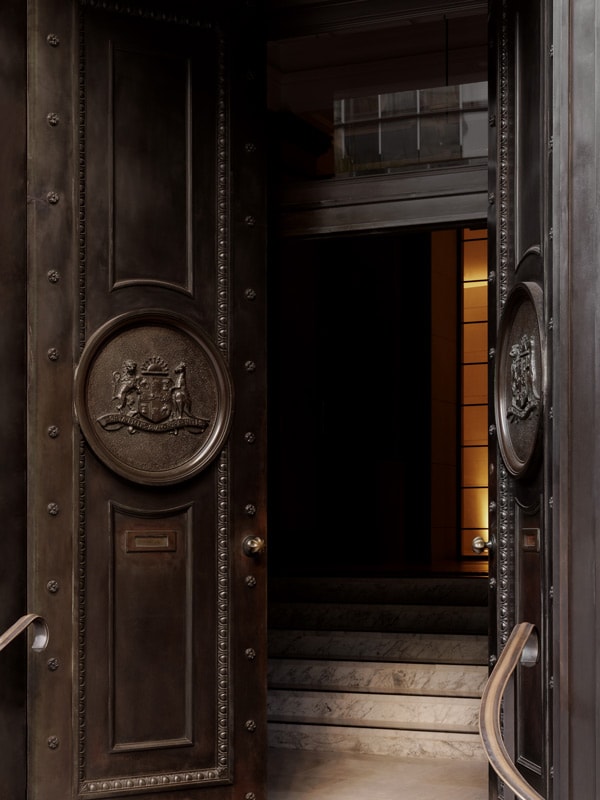
History and luxury greet you the moment you enter the Loftus Street entrance. (Image: Timothy Kaye)
Local stories unfold from the moment we step into the hotel’s Farrer Place entrance, at the southern end of the building. This entryway is marked Department of Agriculture, the first occupants of this section of the building whose original bronze directory board now frame works by Australian Waayni artist Judy Watson, interpreting colonial history with ancestral elements of the Eora people, custodians of the Sydney coastal area.
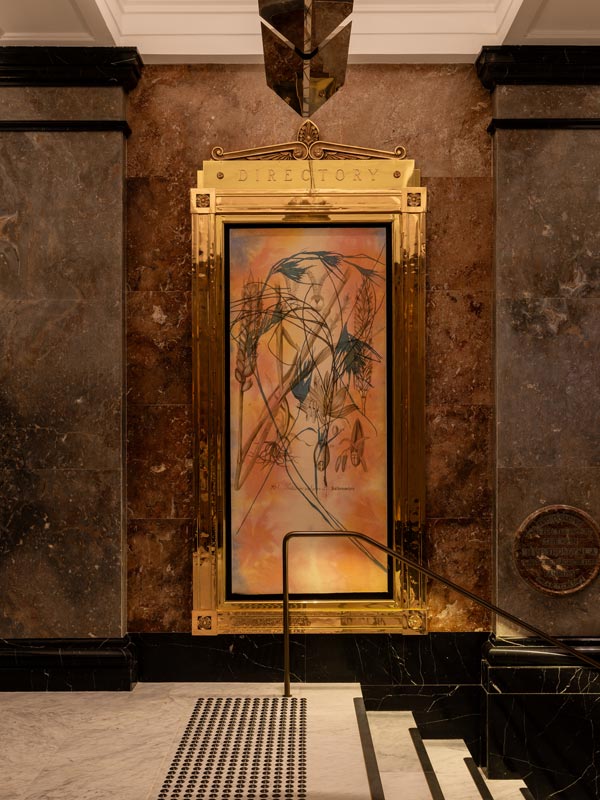
The bronze directory board frames an artwork by Australian Waayni artist Judy Watson. (Image: Timothy Kaye)
A strong focus on connection to Country, as well as a celebration of local talent, continues throughout, with large-scale commissioned works by First Nations artist Otis Carey and Australian textile artists Elise Cakebread and Georgia Bisley.
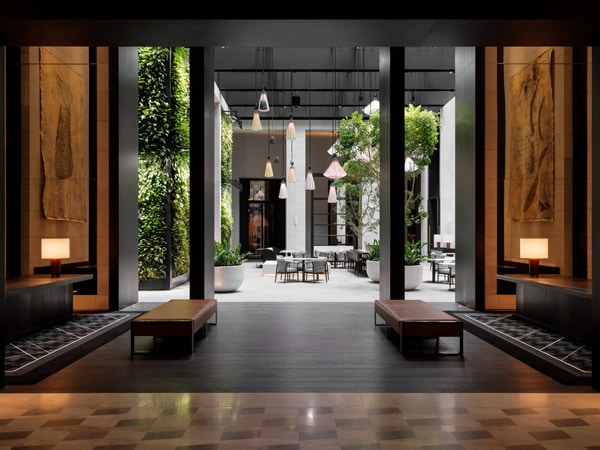
The light-filled central lobby makes for a charming welcome. (Image: Timothy Kaye)
Marble steps lead to a light-filled central lobby and Aperture lounge, which draws inspiration from McRae’s original drawings denoting a garden courtyard. Here, a soaring seven-metre plant wall with 70 different species and pair of weeping fig trees add greenery to this inner-city space.
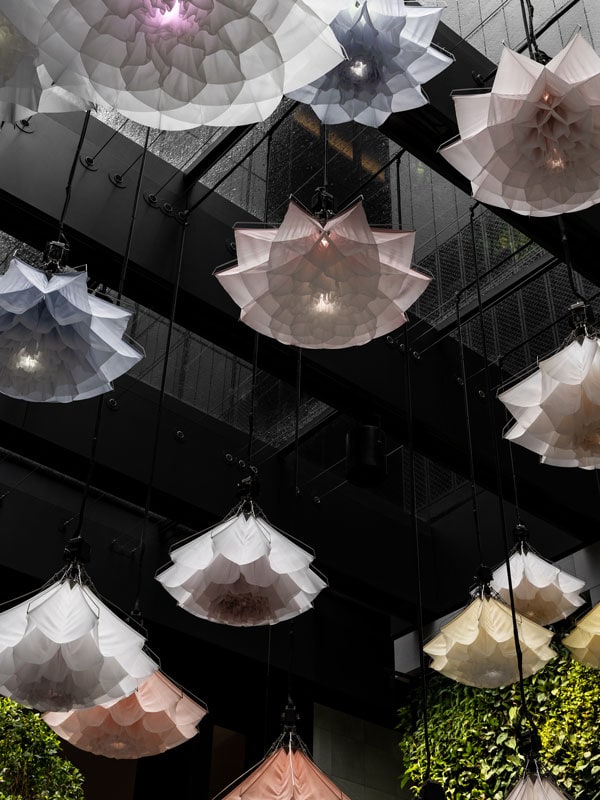
The kinetic floral light installation by Dutch atelier Studio Drift hangs from the ceiling of Aperture Lounge. (Image: Timothy Kaye)
Our eyes are drawn upwards to the kinetic floral light installation by Dutch atelier Studio Drift. The pastel-coloured blooms poetically open and close under streams of sunlight. It’s an elegant cocoon tucked away within the city; one that provides us with an immediate sense of calm.
Up in our corner suite, space is in abundance. Ranging from 46 square metres to a sprawling 230 square-metre suite, the guest rooms set a benchmark for luxury accommodation in Sydney. Hotel interiors were designed by Bar Studio and adorned with curios by Simone Haag, both Melbourne-based. The muted tones create a serene canvas, with premium fixtures and eclectic but sophisticated styling, such as Murano glass, vintage cocktail sets and artisan ceramics.
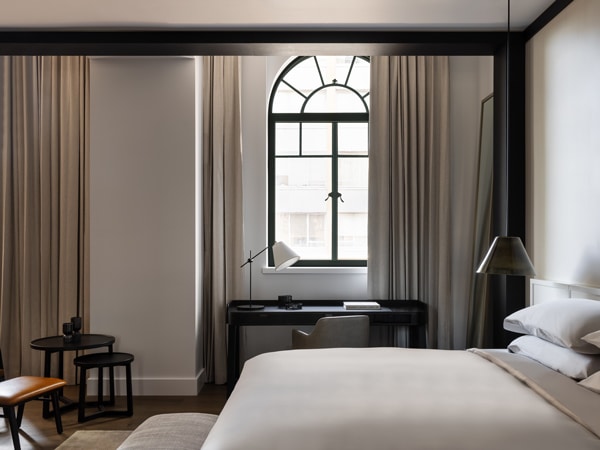
Sink into the ever-so-plush king-sized beds. (Image: Timothy Kaye)
The ever-so-plush king-sized beds are draped in Italian Frette linen and are the kind you sink into. In the bathroom, we have a standalone tub and a double shower, a bespoke collection of sustainable vegan amenities by Haeckels and a drawer full of essentials (hairbrush, toothbrush, nail kit and so on). Everything is controlled at the touch of a button: there’s an iPad for hotel and local information, mood lighting, and window coverings that keep our rooms blissfully dark for languid lie-ins.
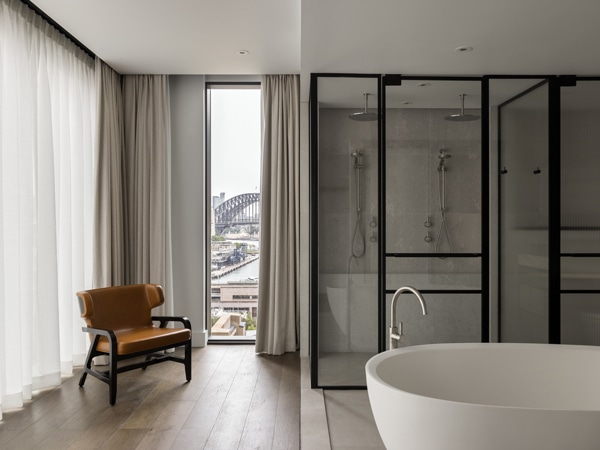
Upgrade to the Liberty Suite for views of the Harbour Bridge. (Image: Timothy Kaye)
Mini bars are filled with premium snacks and Australian drinks, including Young Henry’s lager, Four Pillars gin, Archie Rose whisky and complimentary non-alcoholic beverages by Strangelove. A glass cloche displays a decadent Rocky Road made with chocolate, nuts and confectionary from the Hunter Valley as a welcome treat. We are travelling with our kids, and they were delighted to find a chocolate freckle lollipop on arrival, as well as a cute-as-a-button tepee set up in the corner for playtime.
The signature restaurant Brasserie 1930, created by Brent Savage and Nick Hildebrandt of the renowned Bentley Group, is a destination diner for both gourmands and aesthetes alike. An Australian take on a classic French brasserie, the restaurant is an elegant old-world space. Its menu adopts a local ethos and features the likes of Flinders Island scallop, Murray cod and Kinross Station lamb, complemented with Australian and global wines hand-picked by Hildebrandt. The stellar Australian produce is cooked expertly with age-old techniques such as curing, smoking, fermenting, preserving and pickling.
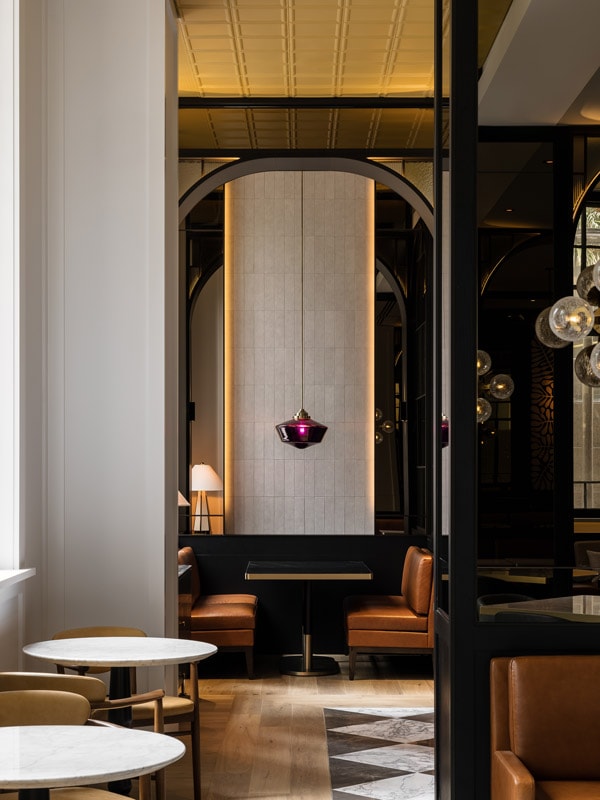
Dine at Brasserie 1930 for an Australian take on a classic French brasserie. (Image: Timothy Kaye)
Breakfast features a continental buffet with an a la carte hot dish menu and barista-made coffee. The waitperson takes our orders and presents the kids with colouring-in packs to entertain them until their scrambled eggs arrive.
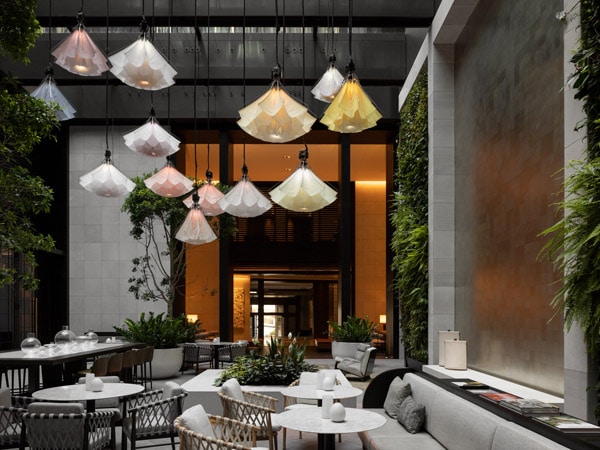
The stylish Aperture lobby lounge. (Image: Timothy Kaye)
Aperture is the lobby lounge, where you can take Australian botanical tea and pastries among the lush indoor-garden setting and robotic blooms above. While McRae Bar, a modern rendition of a Victorian-style drinking den beckons the well-heeled to sip on aperitifs and nightcaps within its moody-lit setting.
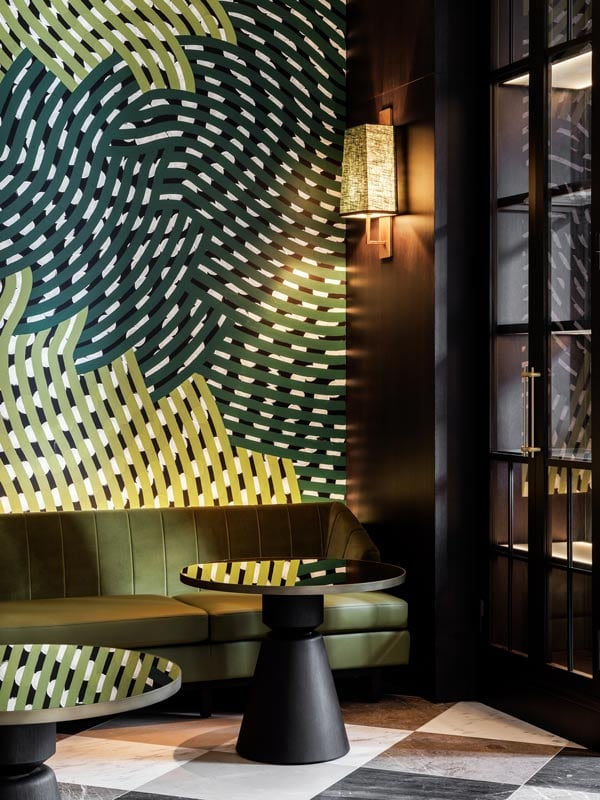
Stop by for a nightcap at the McRae Bar. (Image: Timothy Kaye)
The cultural hub of the hotel is the Living Room, a relaxing lounging space where Capella’s ‘culturalists’ who walk the line between concierge and an all-knowing friend work their magic. These gracious faces are tasked with curating personalised cultural experiences, such as a historic storytelling tour of the local area.
Each evening they invite guests to a welcome ‘Echoes of Eternity’ drink here, made using local Mr Black coffee liqueur. The tipple is named after Sydney street poet Arthur Stace who scrawled the word ‘Eternity’ on the city’s footpaths for almost four decades; his story will be shared as you sip on your cocktail. Within this space, there’s an installation based on a convict-drawn map and artefacts uncovered during the restoration of the building on display.
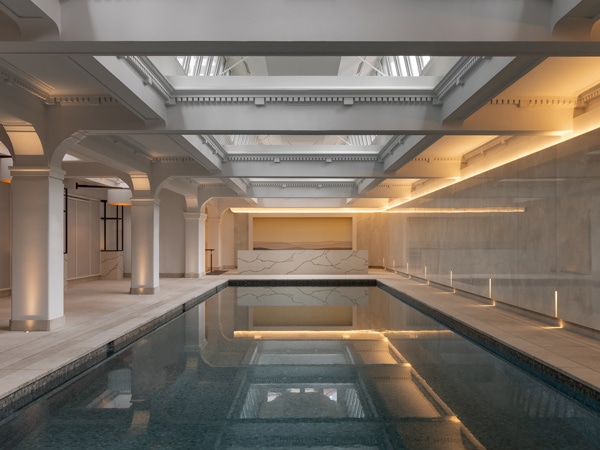
Capella Sydney’s wellness space includes a heated indoor swimming pool. (Image: Timothy Kaye)
On the upper level of the original building (four additional levels were added during the construction), the Department of Education’s former art gallery has been transformed into a wellness space, complete with a heated indoor swimming pool, spa, vitality pool and sauna. The space is lit by vast skylights, fringed by loungers and heritage copper-lined lanterns, as tranquil music further elevates the zen mood.
Auriga Spa is an in-house-only offering with rituals that hinge on celestial phases. There is also an Indigenous Connect to Country treatment that uses stones gathered from remote regions of Australia and the healing vibrations of these heated stones, combined with Australian botanical aromas to shift your state of being.
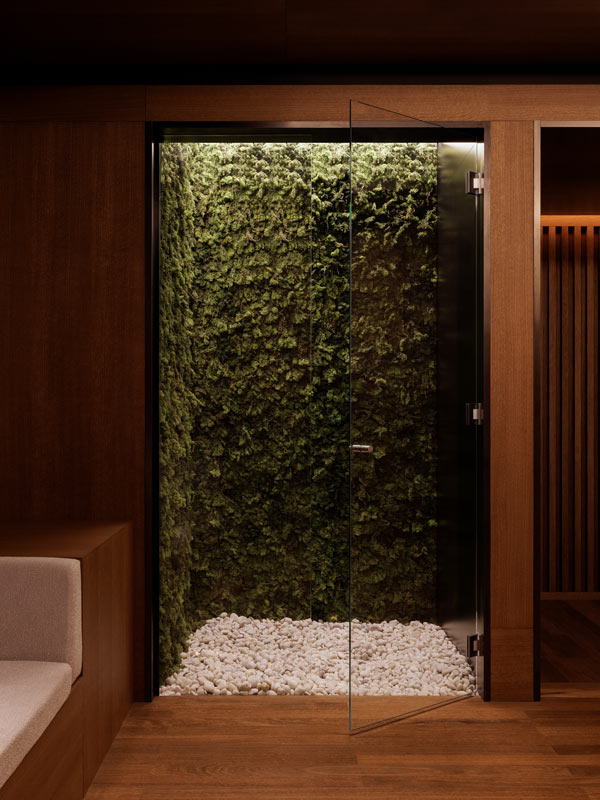
Sample from the unique spa menu at Auriga Spa. (Image: Timothy Kaye)
Guest rooms start from $800 per night in a Deluxe Room including breakfast. Packages including a curated two-hour history tour start at $1500.
Capella Sydney has elevated the city’s luxury hotel scene. Its strong emphasis on local history reverberates through the property, tapping into the untold stories of Sydney through both the tangible and experiential. The hotel oozes unparalleled luxury but more meaningfully connects its guests to culture and place like no other.
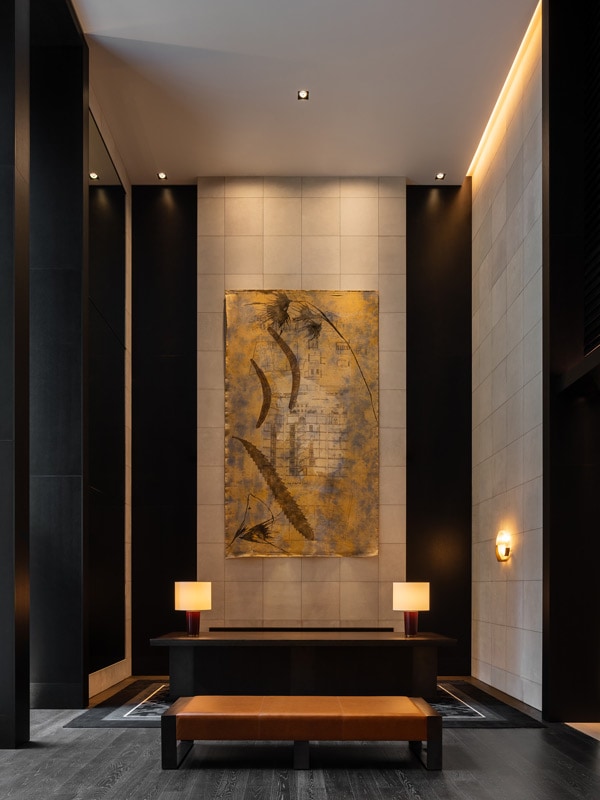
The luxury hotel meaningfully connects its guests to culture and place. (Image: Timothy Kaye)
Score: 5/5
We rated: The way the staff thoughtfully spoiled our children as much as they spoiled us, the mesmerising lobby space and the strong sense of place.
We’d change: If I have to pinpoint something, it would be proof of sustainability and conservation. As a guest, I want to know how a hotel – particularly one so luxurious – is managing its footprint and giving back to the planet.
Notes: Become acquainted with the Capella Culturalists who are experts on the local area and can curate personalised experiences for you. Be sure to pop down to the Living Room, where they work from, for the Echoes of Eternity cocktail between 5:30 and 6:30pm.
Address: 24 Loftus Street, Sydney NSW
For the  best travel inspiration delivered straight to your door.
best travel inspiration delivered straight to your door.
WOW!